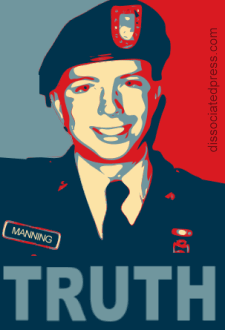Update 7/2/11: Join other supporters at White House twitter townhall, Wikileaks sues Mastercard and Visa

The White House blog has announced that they will be holding their first ever twitter town hall. People can begin asking question via twitter now, and on July 6th at 2pm President Obama will respond to some of them. Let’s flood his twitter with questions about Bradley Manning, so he knows he cannot continue ignoring PFC Manning’s growing support forever. Get more info about the event here.
WikiLeaks announced Friday that it will be suing Visa and Mastercard for blocking European donations to the site, calling this action a “financial blockade” heavily influenced by the U.S. The lawsuit, which will be filed with the European Commission after several stopped payments on potential donations last year. WikiLeaks described the action as “a serious violation of the Competition Rules of the [European Union],” which were implemented in 2011 to ensure free competition among companies and organizations. The blockage of donations, WikiLeaks insists, unfairly imposes contentious political views by blocking the decisions of individuals who freely choose to support the organization.
When pressed about the matter last year, both companies stated that the stopped payments were the result of concerns over whether WikiLeaks’ legal status may result in their being held responsible for contributing to the cause. In the past few years, WikiLeaks accounts have also been frozen by Amazon and PayPal, though these companies were not named in the suit. For more info, visit the link.
Wikileaks also recently released a clever advertisement spoofing Mastercard. Their tagline? “Watching the world change as a result of your work? Priceless.”
What Does it Cost to Change the World? from WikiLeaks on Vimeo.
The Nation writer Greg Mitchell released an intriguing piece this week commemorating the one-year anniversary of the release of the Afghan War logs. Although he recognizes that release of the documents “raised questions about the media coverage of the war,” which left out detailed descriptions of the gravity of the campaign, Mitchell also notes that the leak presented a missed opportunity for true debate. While the 1971 release of the Pentagon Papers intensified an already incendiary fight between supporters and opponents of the Vietnam War, both resistance against, and defense of, the war in Afghanistan has been notably muted, even in light of the war logs being made public. While journalists presented some of the log’s more alarming findings, including Pakistan’s role in assisting in attacks against American soldiers, and Afghan President Hamid Karzai’s pronouncement that his people’s lives were considered “cheap” to Americans whose campaigns killed hundreds of innocents, little real debate, in the press and public, has emerged since. More here.









